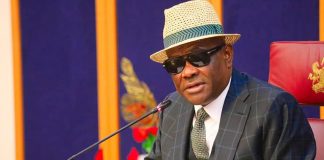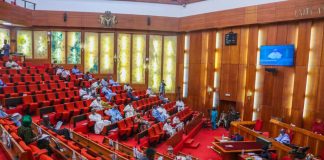🌿 Ruzu Non-Alcoholic Herbal Bitters
Ruzu Non-Alcoholic Herbal Bitters is a natural health supplement specially formulated to:
- ✅ Promote general wellness
- ✅ Detoxify the body
- ✅ Support the treatment of various ailments
Made from a powerful blend of 100% organic and medicinal herbs, Ruzu is completely alcohol-free, making it ideal for:
- 👪 All age groups
- 🌱 Health-conscious individuals
- 🌿 Anyone seeking non-alcoholic herbal remedies
Whether you're looking to boost your vitality, cleanse your system, or support healing the natural way, Ruzu Bitters offers a trusted herbal solution.
Ibrahim Badamosi Babangida, a tyrannical retired general, released his book, “A Journey In Service-An Autobiography,” on Thursday, February 21, 2025. The text is clearly an endeavor to please God Almighty, not any individual.
Given that he is enjoying his twilight years and believes that he is in an age range where he would soon follow the mortal path, it is impossible to ignore his anxiety of avoiding Aljannah if he must make amends here on Earth.
“I regret June 12,” the wicked military tyrant in Nigeria’s political history said in a half-hearted apology during his book presentation, which was well attended by all known noteworthy live victims of his misrule in Abuja. I take full responsibility for the choices made and the events of June 12 that occurred under my supervision. A series of errors and blunders occurred in rapid succession. That was a very unfortunate accident in history. It is reasonable for the country to anticipate my apologies.
In Babangida’s characteristically dishonest language, such well-chosen words evoke sentiments of nostalgia for a preventable military power grab that plunged the nation into an unsolvable political and economic quagmire.
Babangida, other power-hungry people, and living things believe that time teaches the value of life, but that people only undergo transformation when confronted with the harsh realities of existence. The celebration of Babangida’s 83rd birthday marked the arrival of his terrible reality. Furthermore, he recently acknowledged that he had criminally annulled the June 12, 1993, presidential election that Bashorun Moshood Kashimawo Olawale Abiola had won with a landslide victory. In an effort to maintain his pride and his already severely damaged leadership reputation, he has avoided this fact for decades.
Babangida’s book launch may be viewed with levity in a nation where the younger generation lacks a true understanding of their history. To them, it’s easy to write it off as a cliche, often carried out by political figures posing as writers to dress up in their favorite color.
When Niccolo Machiavelli said, decades ago, “Everyone sees what you appear to be, few experience what you really are,” it is hardly improbable that he had Babangida and possibly other Nigerian political gladiators in mind. For Nigerians who were old enough to remember Babangida as an imperial military ruler, the truth that his book launch crowd did not confront is that he was a power-hungry political monster who dominated this nation and almost brought it to its knees on both a political and economic level.
During his imperial reign in power, he surrounded himself with a group of outstanding brains that advocated an amazing policy philosophy that he never empirically implemented. The well-known adage that says to lead by example rather than by precept is actually embodied by Babangida.
The fact that IBB disregarded his impulses, which are selfless messages from his soul, when he was at the height of his political power, only serves to highlight the harsh reality that confronts him today. He gave in to the pleasures of the flesh with joy. And because his conscience is keeping him up at night over his mismanagement of Nigeria and, more specifically, his wrongdoings toward MKO Abiola, he has reluctantly come out with his autobiography to partially acknowledge the tragic reality of how he denied Nigerians the chance to elect a president in Abiola who still holds the record for the most untainted election ever won in this nation’s history.
IBB was too busy blaming General Sani Abacha and Aikhomu through his secretary, who he claimed issued the annulment press statement while away in Katsina state, without his approval, rather than expressing his own sorrow and making a direct appeal for forgiveness from his own countrymen. Even though he knew that neither was alive to protect themselves, he nonetheless did this.
Sadly, Babangida made sure that most of the people he used to plan the evil June 12, 1993 presidential annulment story—including Arthur Nzeribe, Abimbola Davis, Clement Akpamgbo, Justices Dahiru Saleh and Bassey Ikpeme, Professors Humphrey Nwosu and Omo Omoruyi, and—most importantly—General Sani Abacha and Vice Admiral Augustus Aikhomu—were dead. Babangida is a classic that young Nigerians should be familiar with.
The main lesson to be learned from the chapter in his book that focuses on his journey to nowhere political transition policy is that Nigerians should avoid IBB’s deceptive buck-passing presentations because he portrays himself as a victim of a problem that he willfully created, causing Nigerians to suffer unimaginable pain and despair in the process.
When IBB ruled this country, millions of Nigerians adored him but did not trust him because of his false grins and gap-toothed smiles.
“Life’s tragedy is that we get old too soon and wise too late,” as Benjamin Franklin once said, is confirmed by Babangida’s latest admission. IBB’s life and his tenure as this nation’s military ruler are tragic in that he is growing wiser by the day. That is, following his deliberate, vile political manipulation.
As Alexander the Great famously stated: “What you’ve done is all that matters when it’s all over.” True statesmanship and trustworthy leadership are important to Nigerians who have a detached view of history. We don’t care about his late admission; what matters to us is how he irrevocably damaged our political and economic landscapes with dishonest policies and his foreign-induced Structural Adjustment Program (SAP), which caused the Naira to depreciate and a pitiful frenzy to seek and obtain looted loans from the International Monetary Fund (IMF).
According to the documents, Nigerians attempted to halt IBB’s political transformation and its disastrous economic trajectory.
Yours truly joined other patriots in the streets at that time to demonstrate against his anti-patriot policies and political abracadabra. Together with other patriotic writers, journalists, and activists, yours truly wrote editorials and devastating articles for publications, but the “evil genius” and his tyrannical gang disregarded us. As Thomas Paine famously warned, “A body of men holding themselves accountable to nobody ought not to be trusted by anybody.” This is understandable. Babangida and his group imposed themselves on us and had no accountability to any of us. You should not believe the story of such a ruler’s June 12 annulment or apologies.
Despite his questionable admission, Babangida’s misgivings over the June 12 presidential election annulment may still be weighing him down, especially because it also resulted in his humiliating removal from office almost 33 years ago.
It is difficult for us to forget his assertion that he was “not only in government but also in power.” He issued a message to harshly warn the millions of supporters of the June 12 presidential election who were and are continuing demonstrating against his choice at the time. Babangida’s insatiable thirst for power at that time in history made him willing to destroy this nation, even if it meant ruling over its ashes.
Read Also: EFCC Refunds $132,548, N78m to Foreign Fraud Victims
Babangida may find comfort in the divine command that “forgiveness is divine, but error is human.”
Thomas Aquinas’s famous quote, “No evil can be excused because it is done with a good intention,” perfectly captures the injustice of the June 12 criminal annulment and the brutal removal of MKO Abiola for the majority of morally upright Nigerians, even if it isn’t based on a fictitious national security dossier. This is where Babangida’s ambivalent apology at the book launch was pointless.
From Lagos, Sanusi, a journalist and corporate lawyer, wrote this article.















